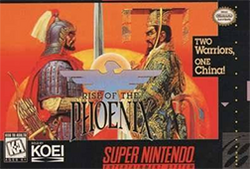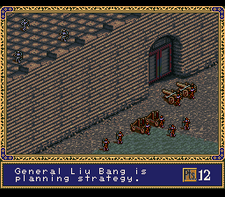Software:Rise of the Phoenix (video game)
| Rise of the Phoenix | |
|---|---|
 North American SNES cover art | |
| Developer(s) | Koei[1] |
| Publisher(s) | Koei[1] |
| Composer(s) | SNES: Tomoki Hasegawa[2] |
| Platform(s) | SNES NEC PC-9801 FM Towns X68000 PlayStation |
| Release | NEC PC-9801:
|
| Genre(s) | Turn-based historic strategy[3] |
| Mode(s) | Single-player,[1] multiplayer[1] |
Rise of the Phoenix (項劉記 Kōryūki) is a multiplatform turn-based historic strategy video game made by Koei for the SNES, NEC PC-9801, and PlayStation console devices.
The game is set in ancient China during the Chu-Han Contention between Liu Bang and Xiang Yu in the 3rd century BC.[1]
Gameplay
The gameplay and control are quite unlike the similarly themed Romance of the Three Kingdoms or Nobunaga's Ambition series. The commands are set in four weeks during one month. The player must first choose the "planning" stage where they can decide to improve their cities or make allies.[1] The next week is called the "Action" stage where the player choose where to move their armies.
The player plays as either Liu Bang or Xiang Yu.[1] Liu Bang has below average stats for Politics and Skills however his Charisma is high and hence it is easy for him to make allies, while Xiang Yu has high personal stats while his Charisma is lower. Although the story is set during a five-year span, the player is not penalized if they don't finish the game in less than five years.
Reception
| Reception | ||||||
|---|---|---|---|---|---|---|
| ||||||
Reviewing the SNES version, Electronic Gaming Monthly called it an "excellent" strategic war simulation. They commented that though action fans would be repelled by the game's pacing, others would prefer this type of game. They praised the numerous options, the music, and the cinematic sequences, and scored it a 6.8 out of 10.[5] GamePro contended that the game's simplified interface compared to other Koei games (specifically, the lack of emphasis on city management and cash flow, and the inability to control individual fighting units), while making the game slightly more accessible to casual gamers, would be highly unsatisfying to Koei's fan base.[6]
References
- ↑ Jump up to: 1.0 1.1 1.2 1.3 1.4 1.5 1.6 "Release date". MobyGames. http://www.mobygames.com/game/rise-of-the-phoenix.
- ↑ "Release information". SNESMusic.org. http://www.snesmusic.org/v2/profile.php?profile=set&selected=2166.
- ↑ Jump up to: 3.0 3.1 3.2 "Release information". http://www.gamefaqs.com/snes/588614-rise-of-the-phoenix/data.
- ↑ "Rise of the Phoenix SNES Review Score". https://www.gamerankings.com/snes/588614-rise-of-the-phoenix/index.html.
- ↑ "Review Crew: Rise of the Phoenix". Electronic Gaming Monthly (Sendai Publishing) (68): 34. March 1995.
- ↑ "Rise of the Phoenix". GamePro (IDG) (80): 105. May 1995.
 |


